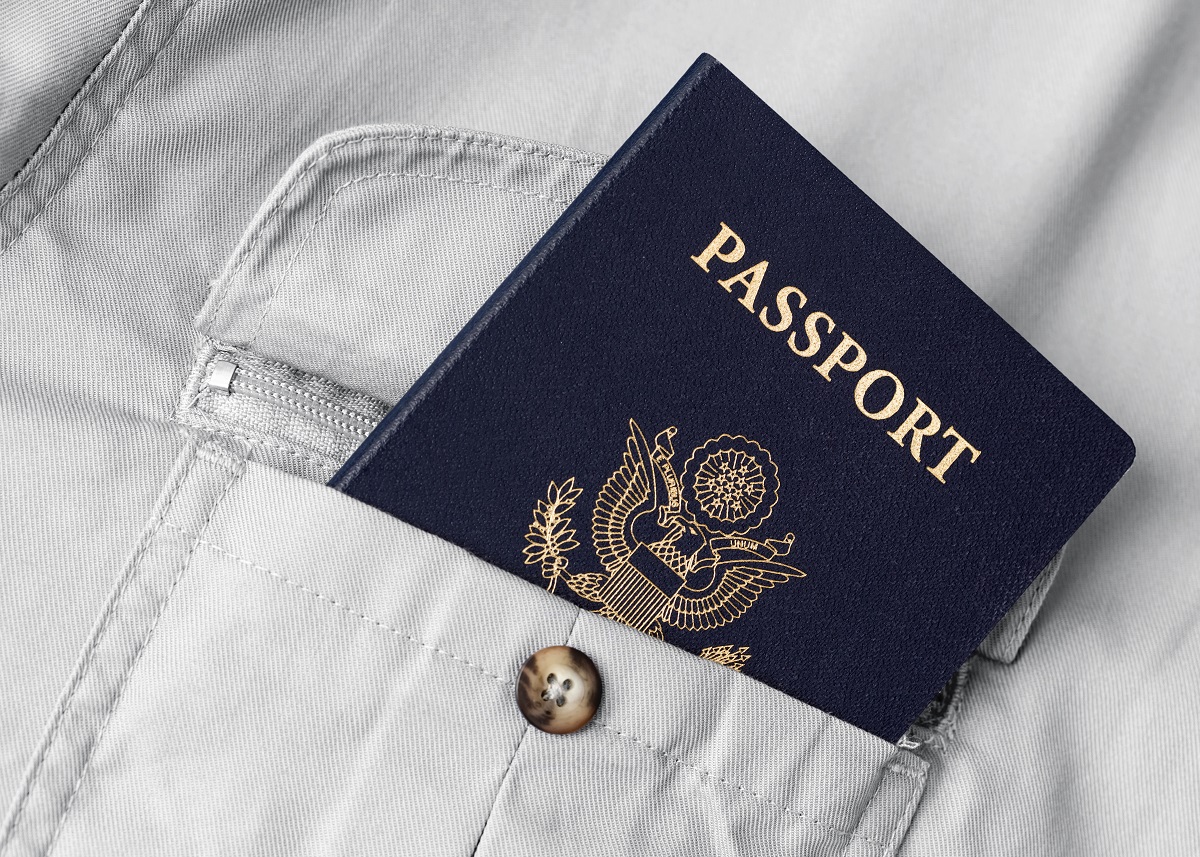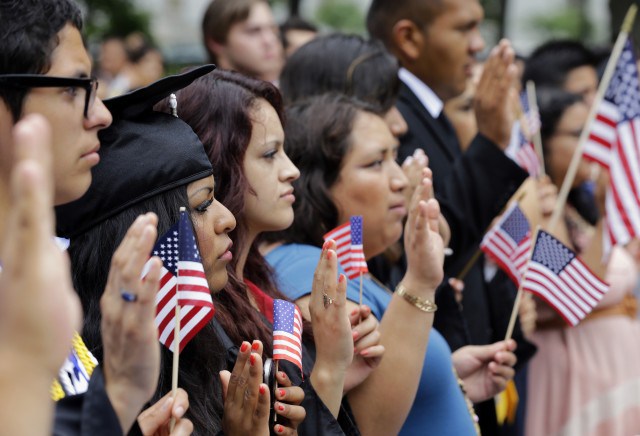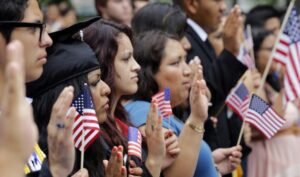
Under current law, the vast majority of people born in the United States and its territories are born as U.S. citizens. But that isn’t true for everyone. Today, individuals born in American Samoa and Swains Island are generally U.S. nationals. Over the course of U.S. history (and depending on the law at that time), some individuals born in U.S. possessions were born U.S. nationals. So what does it mean to be a U.S. national vs U.S. citizen? Nationals do not have the same rights, duties and benefits as U.S. citizens.
However, U.S. nationals who wish to become citizens have a fairly straight forward path. After establishing residence in a U.S. state, U.S. nationals may generally file an application to naturalize as a citizen.
U.S. National vs U.S. Citizen, Explained
All U.S. citizens are U.S. nationals, but not all U.S. nationals are U.S. citizens. As previously explained, individuals whose birth was in an outlying possession of the United States acquire U.S. nationality but do not automatically become American citizens. Presently, the only recognized U.S. outlying possessions are American Samoa and Swains Island. Persons born outside of these possessions but born to one or more non-citizen national parent are also born U.S. nationals (as long as a residency requirement is met).
Historically, persons born in other possessions of the United States during specific periods of time were born as U.S. nationals. This is true in four current or former U.S. overseas possessions:
- Guam from 1898 to 1950, when citizenship granted by an Act of Congress through the Guam Organic Act of 1950;
- The Philippines from 1898 to 1935 when immigration rights of national status was rescinded as part of the Philippine Independence Act, with full independence in 1946;
- Puerto Rico from 1898 to 1917 when citizenship was granted through the Jones–Shafroth Act of 1917; and
- The U.S. Virgin Islands from 1917 to 1927 when citizenship was granted by an act of Congress in 1927.
Today, the residents of U.S. territories that include Guam, Puerto Rico, Northern Mariana Islands, and the U.S. Virgin Islands automatically acquire U.S. citizenship at birth.
How to Prove U.S. Nationality
Generally, individuals from American Samoa and Swains Island can provide a birth certificate as evidence of U.S. nationality at birth. However, many people don’t realize that nationals may also obtain a U.S. passport.
The U.S. Department of State evaluated the feasibility of producing a certificate of non-citizen national status. Because this is such a small group of people, the U.S. Department of State determined it was cost-prohibitive to produce a document with the necessary security features. Since the law says U.S. nationals may apply for a certificate, the Department of State decided to create a special version of the passport. Thus, U.S. nationals may apply for a U.S. passport that delineates and certifies their status as a national but not a citizen of the United States.
For U.S. nationals that want to become U.S. citizens, there is a fairly easy path.
Benefits for U.S. Nationals Who Naturalize
U.S. nationals are allowed to live and work in the United States without restrictions. They are given U.S. passports with a special endorsement stating that the holder is a U.S. national vs U.S. citizen.

Although U.S. nationals are protected by and swear allegiance to the United States, they are not granted the same rights and benefits as full citizens. Non-citizen nationals cannot vote for the election of federal politicians such as a congressman or president.
Therefore, becoming a U.S. citizen opens the door to some new benefits:
- U.S. passport without restrictions
- Voting in all federal elections
How U.S. Nationals Become American Citizens
People who were not born as U.S. citizens may acquire U.S. citizenship through a process known as naturalization. Non-citizen U.S. nationals may file Form N-400, Application for Naturalization, with U.S. Citizenship and Immigration Services (USCIS) to request this benefit. CitizenPath’s online immigration services can you prepare this application and identify the supporting documents you need to submit with your application.
Generally, a non-citizen national may apply for U.S. citizenship under the same rules as legal permanent residents. However, the continuous residence and physical presence requirements are generally met before the applicant decides to naturalize.
U.S. nationals do not need to become permanent residents. Instead, they file Form N-400 after becoming residents. Before filing Form N-400, Application for Naturalization, a U.S. national must become a resident of any State within the United States. In this case, “State” includes any of the 50 United States or territories to encompass the District of Columbia, Puerto Rico, Guam, and U.S. Virgin Islands.
To become a U.S. citizen, a non-citizen U.S. national will need to meet the following requirements:
Be at least 18 years old
To apply under this eligibility category, you must be 18 years of age or older.
Have 5 years continuous residence in the U.S.
Continuous residence means that the applicant has maintained residence within the United States for a specified period of time. You may take trips to other countries but must maintain ties to the U.S. For example, during your trip abroad you continue to file taxes, maintain a residence, and intend to return to the U.S. Have you taken any trips abroad that lasted 6 months or longer? If so, you may have disrupted your continuous residence. Please contact an immigration attorney before filing.
For the purposes of meeting this requirement, your residence in an outlying possession (American Samoa or Swains Island) counts as time in the United States.
Be physically present in the U.S. for at least 30 months out of the most recent 5 years
Physical presence refers to the number of days you must be physically present in the United States during the statutory period up to the date of filing for naturalization. Therefore, you must be physically present in the United States for at least 30 months out of the 5 years immediately preceding the date of filing N-400, Application for Naturalization.
Physical presence is a cumulative requirement. Therefore, you must combine the number of days of all your trips outside the U.S. and its outlying possessions. If you were deployed with the U.S. military, your time abroad will likely count as time in the U.S.
Be able to pass the English and civics tests
You must be able to read, write, and speak English and have knowledge and an understanding of U.S. history and government (also known as civics). CitizenPath can show you How to Prepare for the U.S. Citizenship Test & Interview. USCIS does provide some English language exceptions and medical disability exceptions for those who qualify.
Be a person of good moral character
Everybody makes mistakes; you aren’t expected to be perfect. The United States wants new citizens to be of good moral character, attached to the principles of the Constitution of the United States, and well-disposed to the good order and happiness of the United States during all relevant periods under the law. Examples of things that might demonstrate a lack of good moral character include but aren’t limited to:
- Any crime against a person with intent to harm
- Any crime against property or the government that involves “fraud” or evil intent
- Two or more crimes for which the aggregate sentence was 5 years or more
- Violating any controlled substance law of the United States, any state, or any foreign country
- Habitual drunkenness
- Illegal gambling
- Prostitution
- Polygamy (marriage to more than one person at the same time)
- Lying to gain immigration benefits
- Failing to pay court-ordered child support or alimony payments
- Confinement in jail, prison, or similar institution for which the total confinement was 180 days or more during the past 5 years
- Failing to complete any probation, parole, or suspended sentence before you apply for naturalization
- Terrorist acts
- Persecution of anyone because of race, religion, national origin, political opinion, or social group
If you are concerned that your moral character may be in question due to even a minor incident, you should consult an immigration attorney before filing Form N-400, Application for Naturalization.
The terms nationality and citizenship get used interchangeably, but they can be very different in meaning. Now, you know what it means to be a U.S. national vs U.S. citizen.
About CitizenPath
CitizenPath provides simple, affordable, step-by-step guidance through USCIS immigration applications. Individuals, attorneys and non-profits use the service on desktop or mobile device to prepare immigration forms accurately, avoiding costly delays. CitizenPath allows users to try the service for free and provides a 100% money-back guarantee that USCIS will approve the application or petition. We provide support for the Naturalization Application Package (Form N-400), Immigrant Visa Petition Package (Form I-130), and several other immigration services.
Want more immigration tips and how-to information for your family?
Sign up for CitizenPath’s FREE immigration newsletter and
SAVE 10%
on our immigration services






